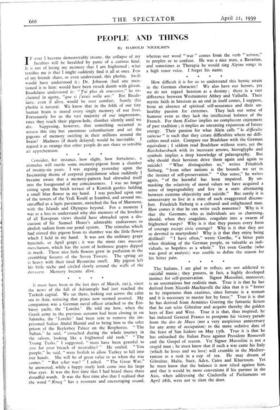It must have been in the last days of March,
1913, since the news of the fall of Adrianople had just reached the Turkish capital. We sat there, looking out across the calm sea to Asia, rejoicing that peace now seemed assured. My companion was a German naval officer attached to the Em- bassy yacht, the 'Lorelei.' He told me how, when the Greek army in the previous autumn had been closing in on Salonika, the Lorelei ' had been sent to remove the im- prisoned Sultan Abdul Hamid and to bring him to the safer prison of the Beylerbey Palace on the Bosphorus. "The Sultan," he said, "crouched during the whole journey in the saloon, looking like a frightened old rook." "The Young Turks," I suggested, "must have been grateful to you for your breach of neutrality?" He smiled. "You people," he said, "were foolish to allow Turkey to fall into our hands. She will be of great value to us when the war comes." "But what war? I asked. "The Great War," he answered, while a happy steely look came into his large blue eyes. It was the first time that I had heard those three dreadful words. It was the first time also that I realised that the word " Krieg " has a resonant and encouraging sound, whereas our word " war " comes from the verb " wirren, to perplex or to confuse. He was a nice man, a Bavarian, and sometimes at Therapia he would sing Alpine songs in a high tenor voice. I forget his name.










































 Previous page
Previous page